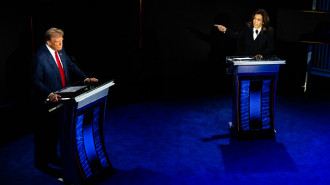As Pope Francis vists the UAE on a tour vaunted by Abu Dhabi as a "new dawn for interfaith dialogue between Muslims and Christians", a new poll has revealed significant anti-Islam sentiments remain behind in Europe.
The poll, which was conducted in January by UK-based market research firm YouGov, found that nearly half of respondents in France and Germany - 46 and 47 percent respectively - saw a "fundamental clash" between their societal values and Islam.
Thirty-eight percent of respondents in the UK and 36 percent of Americans surveyed perceived an incompatability between their countries' values and Islam.
"Clear majorities of Western respondents in the study also described themselves as either very or fairly concerned about the possible rise of extremism in Islam, including 72 percent in both France and Germany, 66 percent in Britain and 56 percent in the United States," YouGov said.
Surveys of Middle East and North African nations, meanwhile, showed significantly fewer people had the same apprehension towards Christianity.
In ultra-conservative Saudi Arabia, 25 percent of respondents felt that Christianity was incompatible with their society, while 22 percent in Algeria, 13 percent in the UAE, and 7 percent in Egypt responded similarly.
Around half of the Egyptian and Emirati respondents viewed Christianity as broadly compatible with their societies' values.
The survey's release came ahead of an interfaith meeting in the UAE attended by the pope and the head of Egypty's Al-Azhar Universty - considered to be the highest seat of learing in Sunni Islam.
In his keynote speech at the gathering, the pope warned that the future of humanity was at stake unless religions come together to resist the "logic of armed power ... the arming of borders, the raising of walls".
Despite the pope's attempts to promote dialogue with Muslims during his visit, human rights groups have highlighted that activists and campaigners are barred from the UAE.
They urged the pope to use his visit to press the Emirati leadership on the murder of thousands of civilians in Yemen and the brutal repression of activists at home.
"Despite its assertions about tolerance, the UAE government has demonstrated no real interest in improving its human rights record," Human Rights Watch said in a letter to Francis.
It was a reference to the UAE's often-stated claims of tolerance - it has a minister for tolerance, is hosting the interfaith meeting Francis is attending and has declared 2019 to be its "Year of Tolerance".
That respect for non-Muslim forms of worship, however, runs up against the political reality of media censorship, repression of political dissent and bans on proselytising and conversion for Muslims.

![Palestinians mourned the victims of an Israeli strike on Deir al-Balah [Getty]](/sites/default/files/styles/image_684x385/public/2024-11/GettyImages-2182362043.jpg?h=199d8c1f&itok=xSHZFbmc)


![The law could be enforced against teachers without prior notice [Getty]](/sites/default/files/styles/image_684x385/public/2178740715.jpeg?h=a5f2f23a&itok=hnqrCS4x)
 Follow the Middle East's top stories in English at The New Arab on Google News
Follow the Middle East's top stories in English at The New Arab on Google News

![Voters in Michigan [Getty]](/sites/default/files/styles/image_330x185/public/2182490468.jpeg?h=a5f2f23a&itok=XMi_sWGX)
